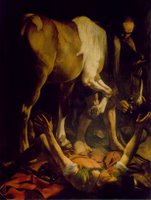Faith Seeking Understanding for January 29, 2006
This feast recalls the end of the “time of purification,” required by the Mosaic law for a woman who had given birth to a son; forty days after Christ’s birth, Mary and Joseph brought the child Jesus to the Temple in Jerusalem, in order to offer sacrifice to Yahweh. This story is retold in the Luke 2:22-40. At the Temple, they offered the prescribed sacrifice, and encountered Simeon and Anna, receiving prophecies about the Child. Traditionally, candles are blessed on this day, signifying the entry of Christ, the Light of the World, into the Temple of Jerusalem; God has truly visited His people and has made His dwelling in our midst.
The Church’s Night Prayer (or compline) canticle (Nunc Dimmitis) also comes from this encounter in the Temple. After holding the Christ-child, Simeon responds with a beautiful prayer that has been used for centuries to end the Liturgical day: “Lord, now let your servant depart in peace, according to your word; for my eyes have seen your salvation, which you have prepared in the presence of all peoples, a light for revelation to the Gentiles, and for glory to your people Israel.”
We also celebrate the famous founder of the Salesians, St. John Bosco, on January 31st. Don Bosco, as he is commonly known, was born in 1815, and died on January 31, 1888. He was canonized by Pope Pius XI in 1934. He is most famous for his care for the poor and abandoned youth, who were often forced to work in the factories, and had no education. Don Bosco taught the children, housed the orphans, and cared for their spiritual needs. He organized the Salesian Society (named for St. Francis de Sales) to continue this important charitable work, which continues the care of youth today.
St. John Bosco continually stressed the importance of regular Communion and Confession, and always ensured that the youth attended Mass on Sundays. As we continue to reflect on Pope John Paul II’s encyclical Dies Domini we are reminded of the importance of the Sunday rest. Christ enters into the definitive “Sabbath Rest” of Heaven through His resurrection; we are therefore called to re-examine the meaning of creation in light of its eternal destiny. The Sabbath rest of the Covenant of Creation foretells and prefigures the final and eternal Covenant.
The Pope connects the “rest” after the Creation story with the Salvation of His People: “The God who rests on the seventh day, rejoicing in his creation, is the same God who reveals his glory in liberating his children from Pharaoh's oppression. Adopting an image dear to the Prophets, one could say that in both cases God reveals himself as the bridegroom before the bride” (no. 12). Our Sunday “rest” is found in the context of creation and redemption. Our new Holy Father, Pope Benedict XVI, has just published his first encyclical, entitled Deus Caritas est – God is Love. It is available at http://www.vatican.va/. May God bless you abundantly this week and always!

